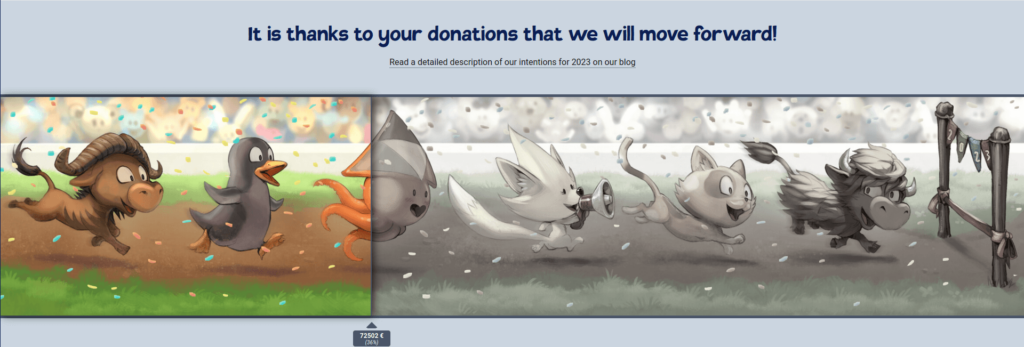Framasoft 2022 : a casserole cooked up thanks to you, thanks to your donations
Did you know that 98% of Framasoft’s budget is based on donations (86% of which are from individuals). It is therefore thanks to you and your support (thank you!) that all our actions are possible. So we wanted to give you a summary of what we have done in 2022. A look back at 12 months of popular education on the challenges of digital and cultural commons, which we wanted to be rich in flavours to please your (and our!) taste buds.
« Collectivise Internet / Convivialise Internet🦆🦆 » The actions of our new roadmap are funded by your donations, You will find a short presentation of this roadmap on our Support Framasoft website.
➡️ Read all blogposts of this campaign (oct. – déc. 2022, mostly in French)

But who is behind the stove?
Behind this little feast, who is there? A small group of 38 people: 28 volunteers and 10 employees, convinced that a world where digital technology allows us to gain freedom is possible! We tell you here what we did, thought about and moved forward in the kitchens. And the ovens are still hot!
Sharing our values, intentions and actions loud and clear
After 3 years of work, workshops guided by Marie-Cécile Godwin and fine-tuning by the association, we published our manifesto in November. This long work made us think a lot and allowed us to highlight very simply the political dimension of our associative project: we want to change the current world for a better one, where the Commons are favoured, where social justice is a fundamental value and where our liberties are preserved.
The second part of this important work was to make sure that our manifesto intentions are understood as soon as they arrive on framasoft.org. We have therefore completely redesigned our main website to make our associative project clear, fluid and easily understandable.
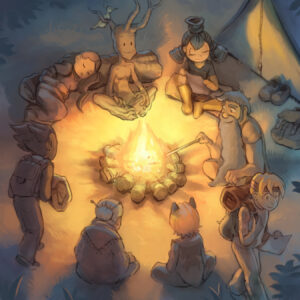
Collectivise Internet / Convivialise Internet: our new roadmap 2023-2025
After 5 years on course with Contributopia, we needed to refine our compass and review our direction: where do we want to continue our exploration for the next few years? This is how the new roadmap Collectivise Internet / Convivialise Internet (code name: COIN / COIN – quack in french) was created: we want to address more directly the collectives and associations committed to a better world (without putting aside the thousands of people who use our tools!).
4 projects have been unveiled and will be progressively improved as the months go by thanks to the beneficiaries’ feedback, with the idea of creating more links between the tools and the people:
- Frama.space: offering liberated cloud to small activist collectives
- Peer.tube: to promote the PeerTube for which we are working
- Emancip’Asso: to promote the digital emancipation of the associative world
- ECHO Network: to understand the needs of popular education in different European countries.
We have detailed the actions of this roadmap and why we are undertaking them on the Framablog (in french…!).
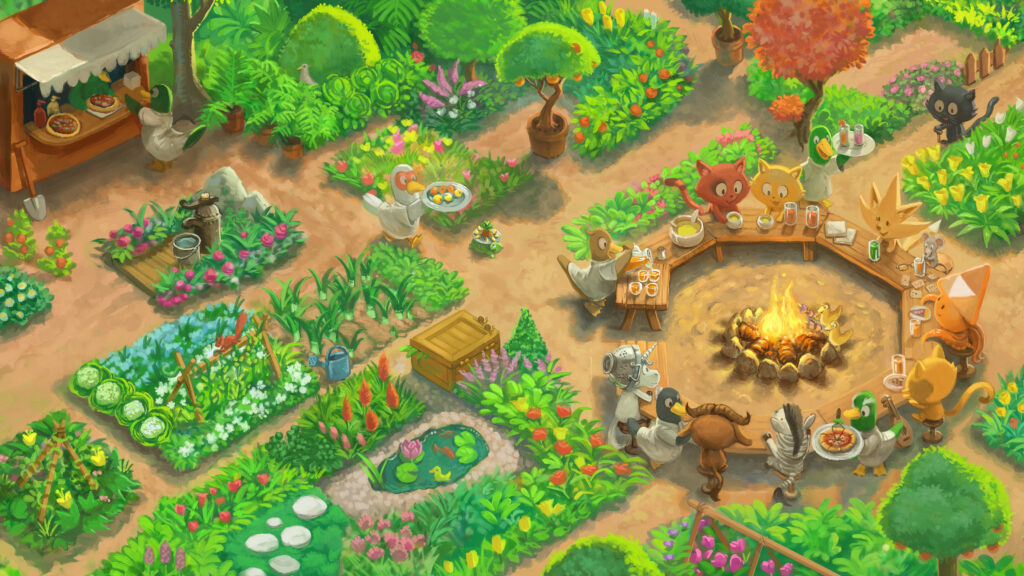
Seeing each other again and seeing you again: it’s a real boost!
This year 2022 will also have been marked by a more intense resumption of shared moments, in the flesh (with good airing!): GAs, Framacamp, events, fairs, conferences, festivals, film screenings, round tables… Because as much as we love doing all this, seeing you and us motivates us, boosts us and encourages us to continue testing new, ambitious, wacky and funny projects (Remember Proutify? The extension has just been updated by one of our volunteers)… it’s so important to have fun doing all this!
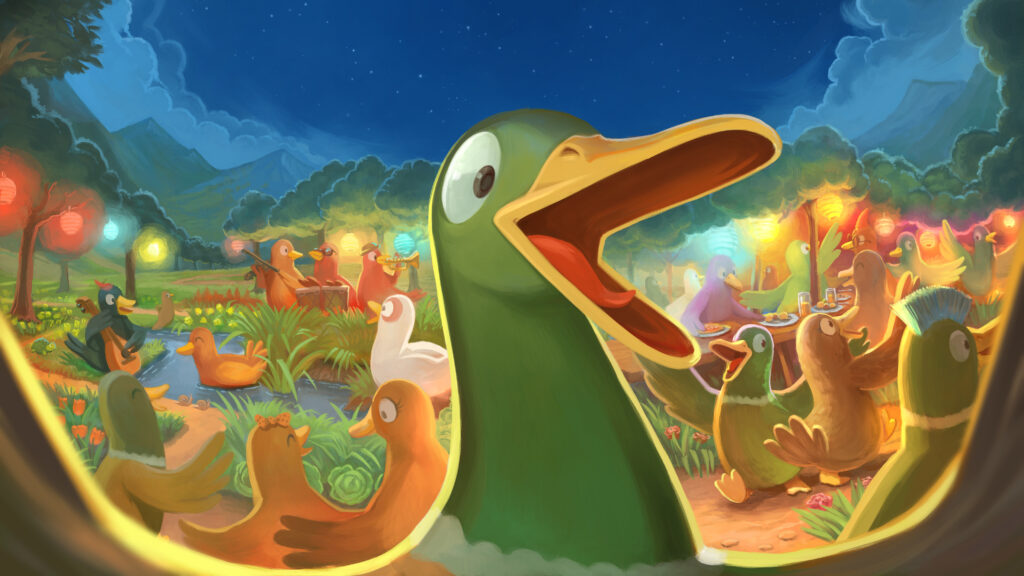
Without you, everything we do would not be possible: 98% of the association’s resources come from donations. Do you think that our reflections are going in the right direction? If you have the means, if you have the desire, we thank you in advance for your support.
As an appetizer: popular education buffet
For us, popular education is the basis for a better world: everyone can share their knowledge and access it, in all simplicity. We present here the different popular education actions carried out this year.
Sharing knowledge and points of view
To begin with, Framasoft intervened, in person or remotely, in various spaces, to talk about digital emancipation, alternative digital, or how to be free online. Our members have made more than 70 interventions, for different structures, associations or groups, in different regions of France. You can watch some of these interventions on our Framatube channel.
Then, Framasoft keeps the pen active on the Framablog. More than 100 articles have been published this year, between presentations of our different actions, translations of Framalang, weekly press review, guest keyboards, interviews of various emancipatory projects, audio articles… The Framablog is a space where we express ourselves without limits.
We also intervened about twenty times in the media when we were asked to share our points of view on digital issues: video interviews, podcasts, articles… You will find the different links accessible on this page.
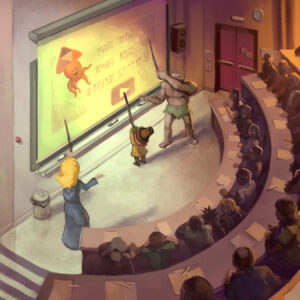
Des Livres en Communs: the publishing house that breaks the rules
Our publishing house, Des Livres en Communs (formerly Framabook), is turning the publishing codes upside down by offering a grant to authors upstream of the writing process, as well as the publication of the work under a free licence, in digital form only.
Following the first call for publication launched in January: « Towards a more contributive, more united, more ethical and more free world: how to equip and organise ourselves together », the project « L’amour en Commun », by Margaux Lallemant and Timothé Allanche was selected. The objective of this publication is to question how the commonality of love, as a means of organisation and a motor of commitment, allows us to build an alternative to capitalist society.
The book is currently being created, between fieldwork and immersions, while being accompanied by our publishing committee.
Des Livres en Communs also participated in the co-editing and proofreading of the « Guide du connard professionnel », a work carried out with PtiloukEditions.

UPLOAD: a free university that is growing
The Free, Open, Autonomous and Decentralised Popular University (UPLOAD: standing for Université Populaire Libre, Ouverte, Autonome, et Décentralisée in french) is a large popular education project initiated and coordinated by Framasoft (for the moment), in a decentralised and networked logic. The objective is to contribute (on our scale) to making society more just and our world more liveable, by focusing on the training of citizens by citizens.
This project is largely formed by the LibreCourses, online courses allowing access to different knowledge and skills. Stéph offered us a conference (in french) to present the topic during the Free Software Days.
This year’s Librecourses will have been punctuated by the theme « Low-tech and digital »: a first session between April and June and a second between November and January 2023. Do you also find the exponential growth of digital technology problematic? Are you interested in reducing the technical footprint of a tool? You can find the videos of the courses here.
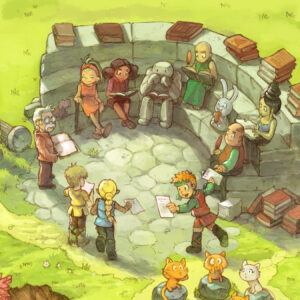
Peer.tube: a showcase for PeerTube that looks like us
With Peer.tube, we want to create a showcase for PeerTube, with quality content selected in advance. It’s our answer to a question we’re often asked: « But where do I find interesting content on PeerTube? The Peer.tube site is already available with a first selection of channels and videos, but the project will only really move forward next year.

Has our popular education buffet piqued your curiosity? Do you think our contributions are going in the right direction? Then we’d like to reiterate that all this was made possible thanks to you and your donations – thank you!
I support Framasoft’s popular education actions
Main course: digital empowerment frying pan
Enabling citizens to become digitally empowered and free their practices is the core of our actions. But what is this good pan made of? Liberated ingredients, quality, and a good pinch of love. We tell you all about it.
Online services to do without the digital giants
Our online services are often the reason why people know us: more than 9 out of 10 people told us so during our survey « What you think of Framasoft » launched at the end of May. And to tell the truth, we were not very surprised. To give you some figures, we count more than 50 million visits on all our sites since the beginning of the year, more than 350 surveys are created every day on Framadate, nearly 15,000 forms are created every month on Framaforms, nearly 110,000 collaborative writing pads are active on Framapad. We still find this incredible!
Between 2014 and 2019, our little association has made around 40 free and trusted online services available to Internet users (yes, 40!). For many reasons, this was too much, and we have gradually closed, between 2019 and 2022, a part of these services, while proposing alternatives. This period of closure is now over: our 16 online services are available to anyone who wants to use tools that respect our freedoms. We have therefore decided to update and redesign the degooglisons-internet.org website to make it an easily accessible gateway, to make it reflect our image and above all to reassure our users.
Keeping these services up to date, managing the machines that run them or answering your questions about support, is a daily job, and we try to put our best efforts into it!
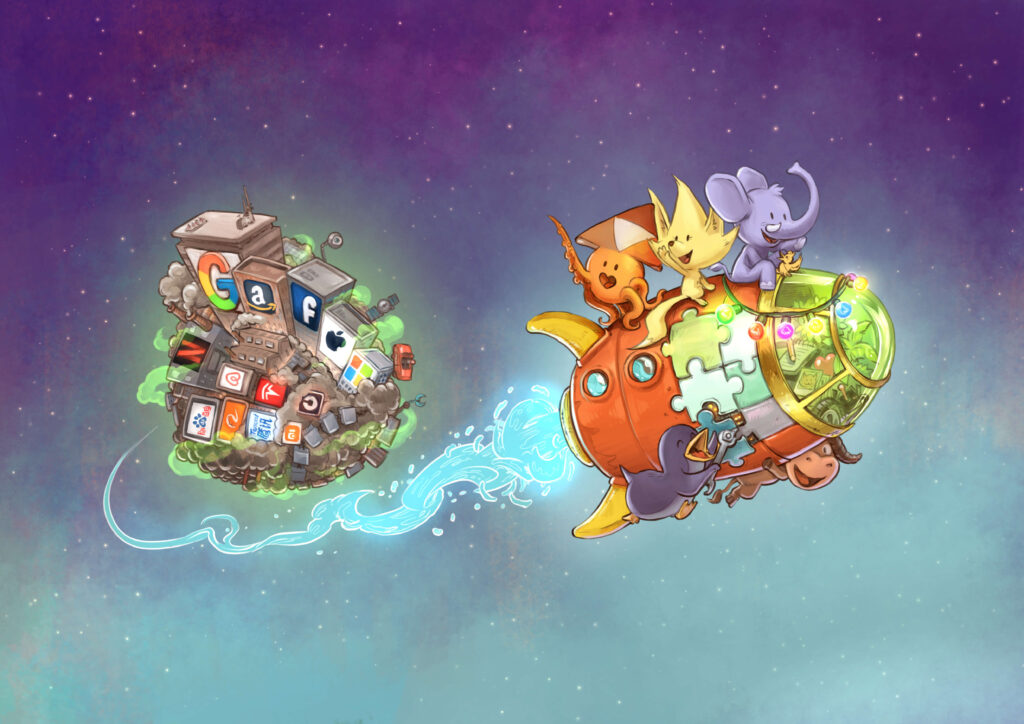
PeerTube: freeing your videos and channels is getting easier
PeerTube is the software we develop (well, one of our employees, yes, one!) to offer an alternative to video platforms. And 2022 will have been a year rich in evolutions, where we now count more than 1000 active PeerTube platforms.
Let’s go to V5!
To begin with, version 4.1 was released in February, bringing interface improvements, new mobile features, an improved plugin system, new search filters and new instance customization possibilities for admins.
In June, we released version 4.2, which brought a great new feature: the Studio, or the possibility to edit videos directly from the web interface. This version also brought more detailed viewing statistics, the possibility to adjust the latency during a broadcast or the direct editing of subtitles (thanks Lutangar!)
In September, version 4.3 was released, allowing the automatic import of videos from a remote channel (thanks to Florent, one of the administrators of the PeerTube Skeptikón instance) and new improvements to the interface and the integration of live videos (a collaborative effort with a designer from la Coopérative des Internets).
And we can already tell you that the new major version, v5, will be released in a few days with (exclusive information!) two-factor authentication or the possibility to send live files to the cloud for admins…
Edit of December 13th : V5 is released ! Find all the information on this article.
Collecting your ideas to enrich the software
Do you create content on PeerTube? Do you enjoy watching videos on PeerTube? In July, we launched the ideas.joinpeertube.org tool (in english) to collect your needs for the software and help us identify new features to develop to make PeerTube more enjoyable to use.
Please feel free to take a look around, to vote for one of the features already proposed or to propose a new one. A big thank you to everyone who took the time to share their opinion!
joinpeertube.org: easier access to PeerTube
joinpeertube.org is THE site that introduces PeerTube, THE gateway to information about this alternative to centralized video platforms, and we want to leave it wide open!
The previous version of joinpeertube.org was mainly focused on the technical features of PeerTube, and therefore addressed to technical profiles. However, now that there are more than 1,000 PeerTube platforms, we felt that it was necessary to promote the software to a wider audience who may be less digitally literate.
After an audit of the site via user tests carried out by La Coopérative des Internets, the web agency proposed improvements to allow a better understanding of PeerTube. You will find all the details of this version on this article of the Framablog: and we hope that this redesign will be useful and will facilitate the use of PeerTube!
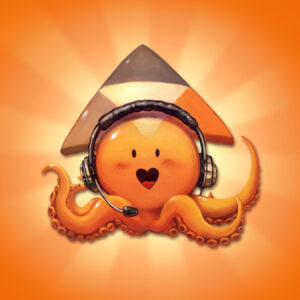
Mobilizon: we make it easy for you to search
Mobilizon is the software that Framasoft is developing (well, one of our employees⋅es and not even full time!) to offer an alternative to Facebook events and groups.
Mobilizon Search Index, a search engine in the fediverse
As we did before with Sepia Search (our search engine for discovering content published on PeerTube), we want to offer a gateway to Mobilizon to show its emancipatory potential.
Mobilizon Search Index references the events and server groups that we have approved on instances.joinmobilizon.org (currently a little over 80 instances, and we hope the list will grow!). The search engine then allows you to explore the events and groups of all these servers, and in different ways: search bar (well, it’s rather classic), by categories (interesting, isn’t it?) or even by geolocating yourself to find events nearby (crazy!).
The source code is free-libre : anyone (with some computer skills, anyway…!) can install a Mobilizon Search Index, and adapt it to their needs.
So, does this make you want to test it?
A v3 focused on research
We released the 3rd major version of Mobilizon in November. The software has reached the maturity we wanted it to have, and that is very motivating!
In the new features: many elements of the software have been modified to avoid accumulating technical debt, the design of the homepage has evolved in design, and the search results page has also been revised (hello Mobilizon Search Index!). Increasing the possibilities of discovering events and groups to make the diversity of content published on Mobilizon more visible was also the goal of this v3.
This v3 was able to evolve thanks to the various contributions (thanks to the community!), was partly financed by a grant from NLNet (thanks to them!), and of course by you, and your donations (again a big thank you).
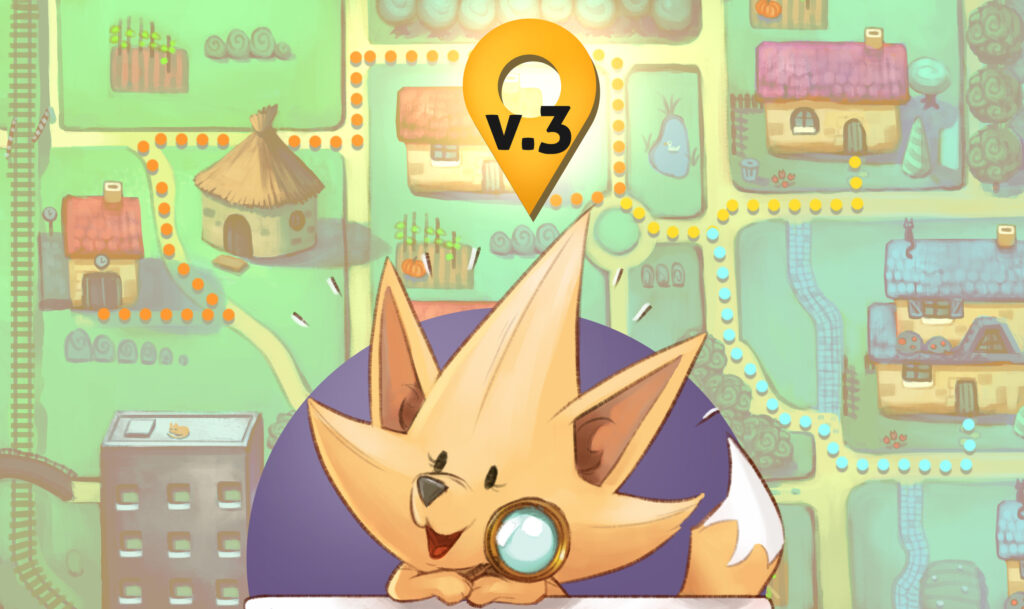
Frama.space: emancipating small associations and activist collectives
Frama.space is a new service (in french) that we offer to small associations and activist collectives, to allow them to match their strong internal values (of social justice and emancipation) with digital tools in the same direction (free and non-monopolistic tools). We want to empower associations and activist collectives by opening digital spaces for sharing, working and organising (up to 50 accounts per collective, based on the free software Nextcloud with: office suite, 40 GB of storage, synchronisation of diaries and contacts, video tools, etc.).
Announced on 15 October when our roadmap Collectivisons / Convivialisons Internet was released, pre-registration has been open since 18 November. Currently, applications are being reviewed (by real⋅es human⋅es!) to open 250 first spaces by the end of the year. Our ultimate goal (a tad ambitious, yes!) being to make 10,000 Frama.space spaces available by the end of 2025.
Do you want to read more about the political aim of the project? We invite you to read this article or to watch this conference, which provides all the important details.

Do you find our actions to empower citizens through digital technology interesting? Do you think we are going in the right direction? All this was possible thanks to you and your donations. Thank you!
I support Framasoft’s digital empowerment actions
For dessert: farandole of a better world (to share!)
Because a good meal is always better when shared. And because it’s by sharing our know-how that we can go further. We act with other structures, which, like independent islands, bathe in the common waters of the same archipelago (can you also imagine floating islands with a good custard?): we keep our independence while sharing values of social justice. Acting together is obvious!
From the kittens’ side
The CHATONS (kittens in french) collective is a bit like a network of online service CSA(Community Supported Agriculture). Where Google, Facebook or Microsoft would represent the agri-food industry, the members of CHATONS would be computer farmers offering organic online services without GMOs, pesticides, aggressive marketing, in short: without a « race for purchasing power ».
At the end of this year, after already 14 litters of kittens, we count 97 members in the collective, i.e. 97 alternative hosts working in the same direction: resisting the gafamisation of the Internet and proposing alternatives respectful of our private lives.
The collective was present on different events during the year (Free Software Days, Digital Accessibility Workshop, Geek Faeries, Freedom Not Fear, Fête de l’Huma, Capitole du Libre), to present its actions. The second CHATONS camp took place this summer, a great time to meet and to relaunch great collective dynamics. Different working groups were created, in particular the group « An association for the CHATONS collective » aiming at an autonomization of the collective with the aim that we (Framasoft) leave little by little the coordination of the collective to the collective itself.
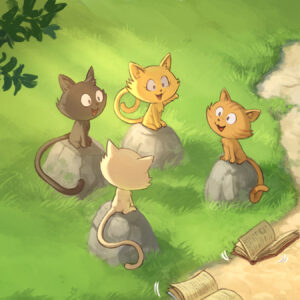
Emancip’Asso: promoting the digital emancipation of the associative world
The aim of Emancip’Asso is to help associations to find support to help their digital practices evolve towards more ethical practices. Designed in partnership with Animafac, 2022 will have been a year of… paperwork (yes, this is often the beginning of ambitious projects!).
We spent some time putting together a steering committee (20 members) that was varied, heterogeneous and representative of the diversity of the associative world. Then, as the project was intended to be financially independent, the first six months of the year were devoted to fundraising, which bore fruit (hurrah!). We currently have four funders (and we hope that the list will continue to grow!): the Charles Léopold Mayer Foundation for the Progress of Humankind, the Crédit Coopératif Foundation, the Un monde par Tous Foundation and the Libérons nos ordis Association.
The first funding allowed us to work on the first stage of the project: a training course for ethical hosts to help them accompany associations in their digital transition. Search for speakers, preparation of the programme and logistics: the training (it’s full!) will take place in Paris, from 16 to 20 January 2023 (the programme in detail is here).
Finally, at the end of this year, we applied to different student programs to set up two working groups: one on the graphic identity of Emancip’Asso (in progress!), and a second one on the realization of the emancipasso.org website (to come).
You can find Angie and Anne-Laure presenting the project on video here.
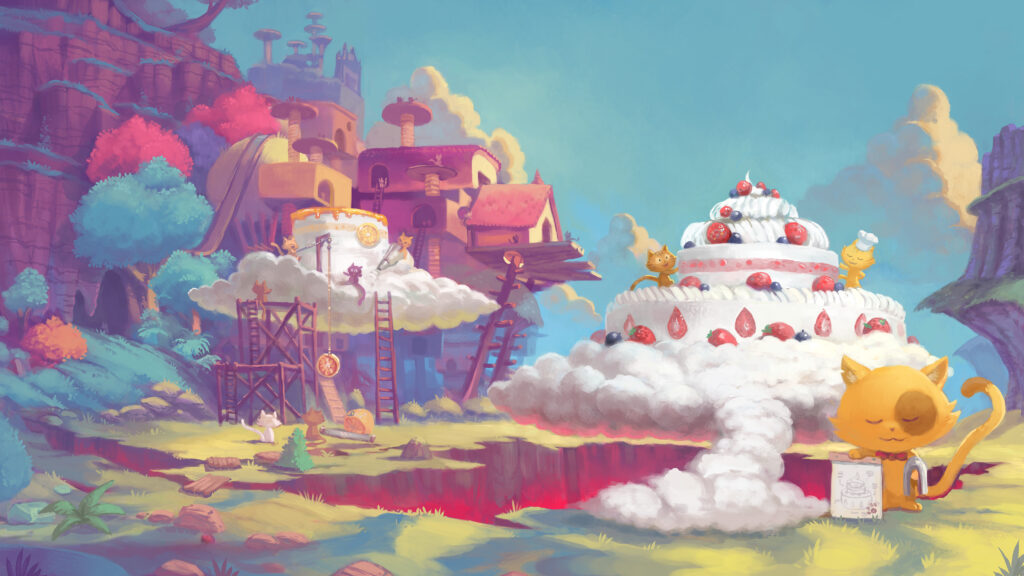
ECHO Network: understanding the digital needs of popular education, here and elsewhere
2022 will also have been the year of the development of the European project « Ethical, Commons, Humans, Open-Source Network » (ECHO Network, it’s a bit easier to remember…). Led by the popular education movement CEMÉA France, the project brings together 7 structures from 5 European countries (France, Belgium, Croatia, Germany, Italy). What do they have in common? The support, each at its own level, of the public in their autonomy and emancipation.
The objective of the project is to exchange on the difficulties, opportunities and ways to accompany the public that our associations serve towards a digital transition. And the background: how to accompany this emancipation in (or even by) a digital world centralised by the web giants?
The first meeting of the exchange will take place in Paris from 14 to 17 January 2023. This opening seminar will allow us to unpack the general theme: supporting the digital transition of associations that train citizens. Read more here.

And that’s not all!
Knowledge transfer
With Hubikoop (territorial hub of the New Aquitaine region for an inclusive digital environment) we started in September the animation of the course « Accompaniment to the discovery of ethical digital services » : 8 workshops for the actors of the digital mediation in New Aquitaine. This partnership is starting to give rise to new ideas, which we will tell you about next year!
In the framework of the PENSA project with Aix-Marseille University, we intervened in June for a training of trainers on the theme « Free software and services for the digital emancipation of citizens ». The final objective is to enable teachers to develop their skills for a critical use of digital technology in education.
We have also carried out various actions in connection with AFPA and more specifically the people in charge of the training of Digital Mediation Space Managers, to transmit more knowledge on ethical digital.
Framasoft also became a member of the MedNum. Our ambitions behind this? To raise awareness of free tools among digital mediation actors, to train digital mediators in ethical alternatives and to equip the cooperative itself with free tools.
Finally, you will find us in the booklet « Le temps des conquêtes, les nouveaux horizons de l’ESS » published by ESS France.
Important statements taken
The L.A. Coalition (of which Framasoft is a member) took a position in April on the Republican Commitment Contract: the collective denounced it as a potential source of litigation and abusive sanctions by the administration or public authorities to the detriment of associations and foundations.
The first abuses of the republican commitment contract quickly emerged. We signed the tribune «Civil disobedience is part of the freedom of expression and the repertoire of legitimate actions of associations », published in l’Humanité in September: associative freedoms are essential and currently in danger.
We also signed the tribune « For the digital commons to become a pillar of European digital sovereignty » by Wikimedia France in June. Cultural commons are an integral part of Framasoft’s social purpose, defending them is essential!
Support by conviction
Following the announcement of its very difficult financial situation this summer, we supported the media NextINpact (very qualitative digital watch) by buying « suspended » subscriptions that we drew at random.
We also supported affordance.info (qualitative content on digital and relevant social issues) by migrating its blog from a non-free tool (Typepad) to a free tool (WordPress), all hosted by us.
We proposed a Signal proxy (free messaging) following a call from the structure informing of the blocking of its application by the Iranian regime in the face of the current revolts.
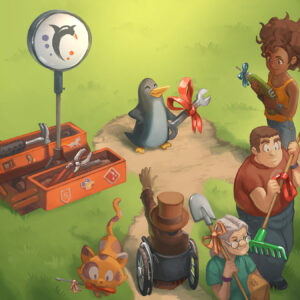
Did you like our shared dessert? You think that these actions carried out with other islands of our archipelago are to be encouraged? Know that they are also only possible thanks to you and your donations. Thank you again!
I support Framasoft’s archipelago actions
Framasoft, today, is more than 50 000 € of expenses per month. We closed the 2021 accounting year with a deficit of €60,000 (which donations – more generous during the 2020 confinements – fortunately allowed us to absorb).
At the time of writing, we estimate that we are €127,500 short of our annual budget and can confidently launch our actions in 2023.
If you can (yes, at the moment it is particularly complicated), and if you want to, please support the actions of our association.
I support the actions of Framasoft
